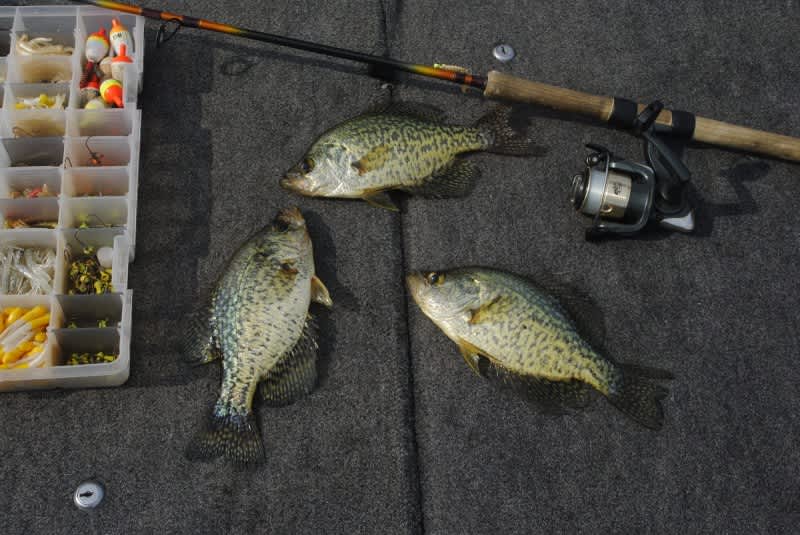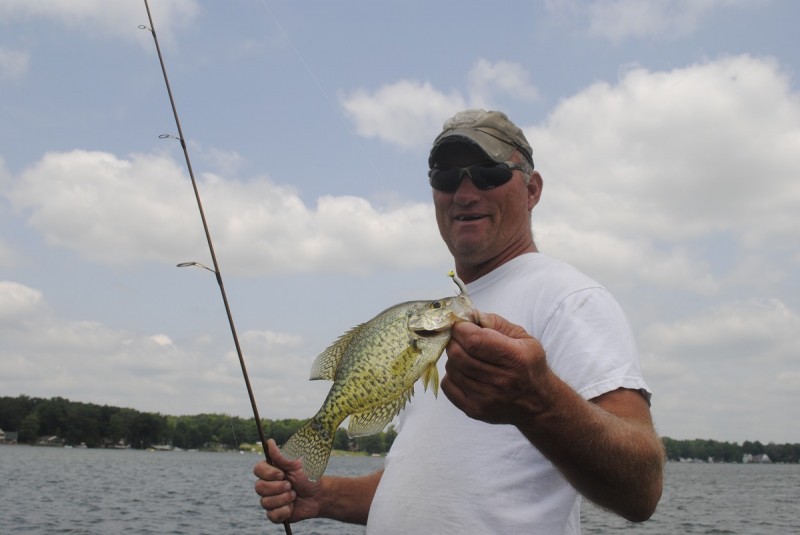Michigan’s Summer Crappie Bite is Top-notch
Bob Gwizdz 07.31.15

Jim Horn is a bass fisherman, and a good one at that. That’s what he was doing when I met him, more than 20 years ago, and I fished with him a handful of times before I realized that was just part of his game. I found out he’s a darn-good crappie fisherman, too, and every spring I try to make a pilgrimage to Southwest Michigan and meet up with Horn to stroke the crappies.
When I called him recently to see how his bass fishing was going, it didn’t take long before he mentioned he’d stumbled onto a batch of summertime crappies the other day. He asked whether I would like to try ’em. I bit.
As the story goes, Horn was out on a weedy flat on Indian Lake bass fishing when, well, I’ll let him take it from there.
“The guy with me always has a crappie rod out,” he said. “He threw out a jig and caught a crappie. Then he caught another one, so we went to fishing them.
“We were in seven or eight feet of water and the weeds came up to within about three feet of surface. I tried fishing a jig under a bobber, but it didn’t work—you had to keep the bait moving. There were so many in there I figured, ‘now’s a good time to experiment with stuff,’ and we wound up catching them on five different baits—crankbaits, small jerkbaits, beetle spins. We caught 70 or 80 of them in a couple of hours.”
They went back a couple of days later and though it was a little bit slower, they still caught more than 50.
I caught up with Horn in early afternoon a few days later—the day after a cold front had passed through, of course—and Horn headed directly to where he’d left them. After a few casts, he hooked and lost one. Then he caught one. A couple of casts later, I caught one. We stayed about a half hour and put a half dozen into the boat (along with a handful of toy largemouths).
“Well, they’re still here but it’s not like it was,” Horn said. “Let’s move.”
He got on the trolling motor and headed down the flat until we hit some more fish, again in an area where he’d caught them before. We caught three or four (and a couple of small bass) when the bite played out.
So we switched gears and went deep. That’s how Horn used to fish for crappies in the summer before he got bit (hard) by the bass bug.
“We fished on those long points that extended farthest out into the lake or the deepest weed lines,” Horn said. “You’d count that jig down to find where the fish were. Some days you’d be out in 18 feet of water you’d catch them eight or 10 feet down. Other days they’d be six or eight feet down, and other days they’d be at three or four feet. The shallower they were the more active they were—the easier it was to catch them.
“On cold-front days, deep weeds were the best.”
We didn’t find any crappie on the deep weeds, but we kept catching small bass, so much so that Horn picked up his bass rod and tied on a big homemade chatterbait—a jig with a crankbait-like metal lip on the front, rigged with a big swim bait body. He proceeded to catch four good bass, the smallest of which was better than four pounds. But when the bass bite petered out, we went back up on the flats to look for crappie.

“Usually you want some good weeds,” Horn said. “Back 25 years ago there seemed like there was more cabbage and the cabbage was the best, but if the lake is primarily coontail, then coontail—just good, healthy weeds. I’m kind of convinced the weeds are more important for the bait than the crappie. The bait fish hide in the weeds and the crappies move into eat them. Anytime you’ve got that many fish on an area, there’s definitely bait there. Just drift a flat until you find the area that’s holding them.
“On lakes that don’t have great weeds, the crappies are more spread out.”
We moved up on the flat and caught a few, moved, and caught a few more. But the crappie bite had slowed.
Horn said he’s rediscovered summer crappie fishing after years of getting away from it.
“I used to always have a crappie rod in the boat and I’d pick it up quite a bit,” he said. “We didn’t catch them every day, but sometimes we’d get into them. But I got away from it when I got into tournament fishing (you have to put time in to figure out the bass), so the crappies took a back seat.”
Nowadays he always carries a crappie rod and though he doesn’t necessarily target them—he’s still a bass angler—when he finds them, he zooms in.
We wound up catching about 20 crappies. For four hours on the lake, that’s not bad. Horn, however, was a little disappointed.
“I think we just got one of those negative-bite days,” he concluded.
For more information on Michigan fishing go to michigan.org. Click here to purchase a Michigan fishing license online.
This article was produced in partnership with Pure Michigan.

